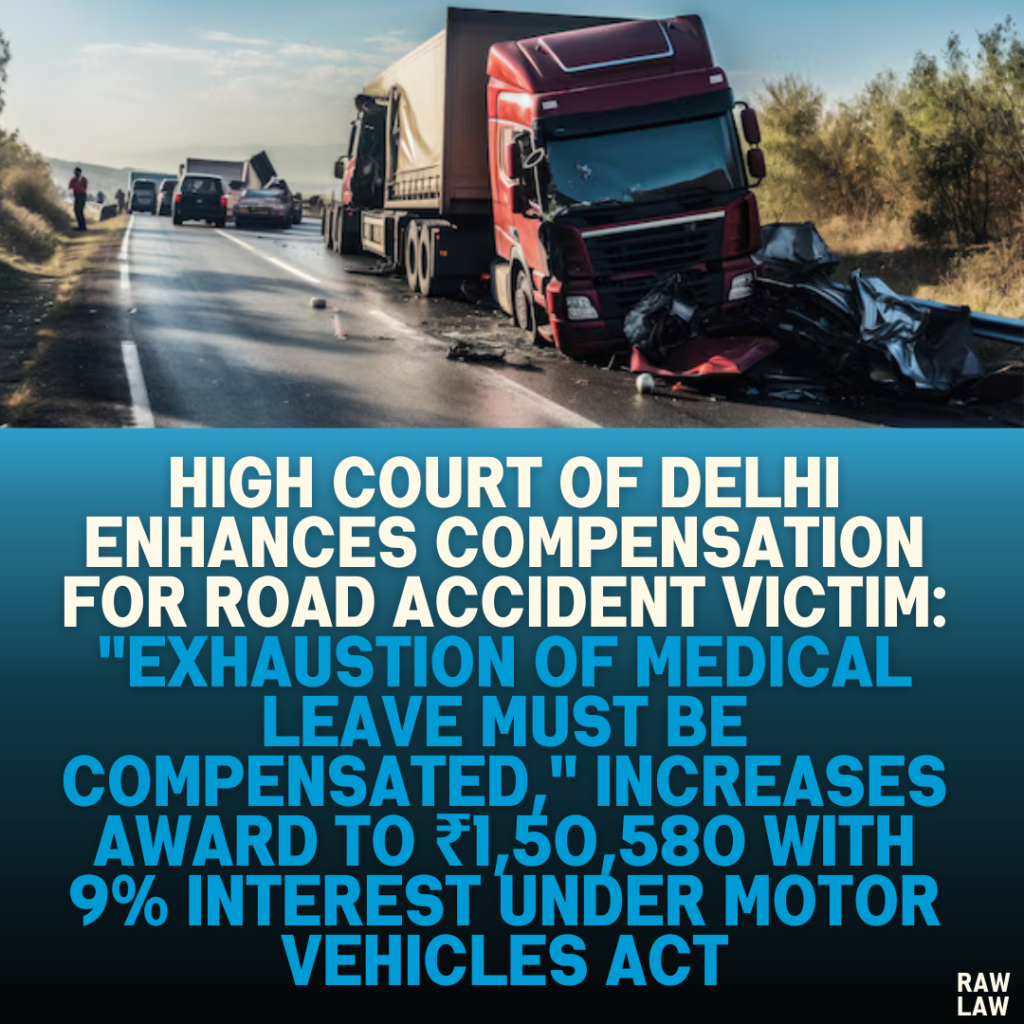Court’s Decision
The High Court of Delhi, presided over by Justice Neena Bansal Krishna, decided an appeal under Section 173 of the Motor Vehicles Act, 1988. The appellant, a victim of a road accident, had sought an enhancement of the ₹1,20,580 compensation awarded by the Motor Accident Claims Tribunal (MACT). The court increased the compensation to ₹1,50,580, adding ₹30,000 towards the exhaustion of one month’s medical leave. Interest at 9% per annum was ordered on the enhanced amount.
Facts
The appellant, an employee of the Indian Air Force, was involved in a tragic road accident on November 15, 2013, while traveling with family members. A negligently driven truck collided with their car, resulting in the death of three passengers. The appellant suffered severe injuries, leading to:
- Permanent physical disability: 50% due to head injury and 20% due to disc herniation.
- One month of hospitalization and prolonged treatment.
Initially, the MACT awarded ₹1,20,580, which included compensation for pain and suffering, conveyance, and special diet but excluded significant heads such as:
- Loss of income during medical leave.
- Future treatment and attendant charges.
The appellant sought enhancement on these grounds.
Issues
- Was the compensation for loss of income during medical leave adequately assessed?
- Should compensation for loss of earning capacity, attendant charges, and future treatment be awarded or enhanced?
- Were non-pecuniary heads, such as pain and suffering, adequately compensated?
Petitioner’s Arguments
The appellant argued:
- He suffered a permanent disability affecting his earning capacity, yet no compensation was awarded under this head.
- The tribunal erred in not awarding compensation for exhaustion of medical leave, which would otherwise be available for future emergencies.
- The amounts awarded for non-pecuniary heads such as pain and suffering were inadequate.
- Compensation for attendant charges and future treatment was unfairly excluded.
Respondent’s Arguments
The insurance company contended:
- The tribunal had correctly calculated compensation under all heads.
- No evidence was provided to substantiate the claims for loss of earning capacity, attendant charges, or future treatment.
- The appellant’s medical leave was paid, negating the need for additional compensation.
Analysis of the Law
The court examined the principles of just compensation under the Motor Vehicles Act, emphasizing:
- Compensation must account for all pecuniary and non-pecuniary losses directly resulting from the accident.
- Loss of income during medical leave, even if paid, justifies compensation as it deprives the victim of leave for future contingencies.
Precedent Analysis
Although no specific judgments were cited, the court adhered to established jurisprudence emphasizing fair and just compensation under the Motor Vehicles Act. This included recognizing that compensation should restore, as far as possible, the victim’s financial and emotional losses.
Court’s Reasoning
- Loss of Income: The court acknowledged that the appellant’s medical leave was paid but noted that it exhausted leave entitlement for future use. The court awarded ₹30,000 for the month of leave used during recovery.
- Loss of Earning Capacity: The appellant failed to produce medical records linking his injuries to a reduction in earning capacity. The court denied compensation under this head.
- Non-Pecuniary Heads: Compensation for pain and suffering was deemed adequate given the nature of injuries and the time elapsed since the accident. Similarly, conveyance and special diet compensation were considered reasonable.
- Attendant Charges and Future Treatment: The court found no evidence to support claims that the appellant required an attendant or would need further medical treatment.
Conclusion
The court enhanced the total compensation to ₹1,50,580, including ₹30,000 for the exhaustion of medical leave. The insurance company was directed to deposit the enhanced amount within 30 days, with interest at 9% per annum.
Implications
This judgment highlights:
- Recognition of Medical Leave: Courts acknowledge the loss of paid medical leave as a compensable head, reinforcing employee rights.
- Evidence Requirement: Claimants must substantiate claims for enhanced compensation with credible medical and financial evidence.
- Fair Application of the Motor Vehicles Act: The judgment reflects a balanced approach to ensure victims are fairly compensated without speculative or unsupported claims.
